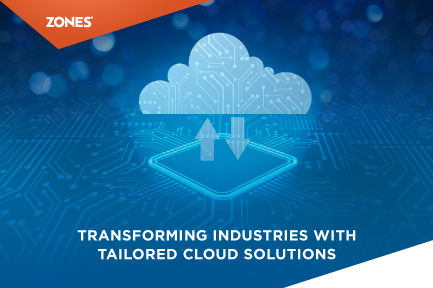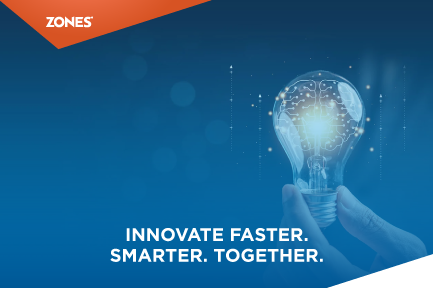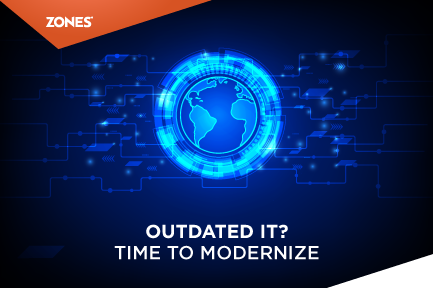Zones Innovation Center: Accelerating Digital Transformation with AI and Cutting-Edge Solutions
Are your IT strategies agile enough to respond to the rapid changes in digital technologies? Despite this, a recent McKinsey report found that 89% of...
3 min read
![]() Zones
:
Dec 25, 2024 9:10:34 AM
Zones
:
Dec 25, 2024 9:10:34 AM

Problem: Adapting generalist cloud solutions to their particular workflows and regulatory needs is a recurring difficulty for many businesses.
Agitate: This puts businesses at a competitive disadvantage by causing inefficiencies, problems with compliance, and trouble scaling their operations.
Solution: Industry clouds offer a customized strategy with pre-configured workflows, AI-driven analytics, and integrated regulatory compliance. They are especially made for sectors like healthcare, retail, and manufacturing.
Customized ecosystems created with the particular needs of particular industries in mind are known as industry clouds. These solutions are designed for vertical-specific workflows, as opposed to general-purpose cloud platforms, so businesses can function effectively without investing a lot of money in customizations.
By addressing common challenges, industry clouds empower businesses to focus on growth rather than infrastructure adjustments. By addressing common challenges, industry clouds empower businesses to focus on growth rather than infrastructure adjustments.
Problem: Hospitals must comply with stringent laws like HIPAA while integrating disparate data sources, which presents increasing difficulties
Solution: Clouds designed specifically for the healthcare industry offer secure data-sharing features, telemedicine platforms, and EHR integration.
Impact: These solutions guarantee legal framework compliance, enhance access to care, and lower patient data errors.
Example: a top hospital group improved patient outcomes and cut administrative expenses by 20% by integrating EHR systems across several locations using an industry cloud.
Problem: To succeed in the cutthroat retail industry, real-time customer data and inventory optimization are essential.
Solution: AI-powered retail clouds provide cutting-edge capabilities for inventory control, marketing campaign personalization, and customer behavior tracking.
Impact: By anticipating demand trends, retailers can prevent overstocking and provide highly customized shopping experiences.
Example: Using AI-driven demand forecasting, a global fashion retailer increased sales by 15% while reducing inventory overstock by 25%.
Problem: Financial institutions find it difficult to identify fraud and adhere to strict laws like PCI DSS and GDPR.
Solution: Clouds for the financial sector provide scalable, safe platforms with integrated risk assessment, automated reporting, and fraud detection tools.
Impact: By guaranteeing adherence to legal requirements, these solutions increase operational effectiveness.
Example: a mid-sized bank reduced losses by 40% by implementing a cloud solution tailored to the financial industry to identify fraudulent transactions instantly.
Stat: Businesses using data-driven insights report a 22% increase in efficiency and productivity.
In order for businesses to fully utilize industry-specific cloud platforms, cloud advisory services are crucial.
In order to pinpoint problems and match cloud adoption plans with long-term goals, consultants collaborate closely with companies.
Advisory services guarantee a smooth transition to industry clouds by setting up compliance frameworks and integrating AI tools.
Vertical-specific solutions that tackle particular problems and open up new avenues are the way of the future for business. Examine how your operations can be transformed by industry clouds.
Get Started Now
FAQs: Industry Clouds Answered
Q1: Are industry clouds suitable for small businesses?
A: Yes. Many industry-specific solutions are scalable, making them accessible for businesses of all sizes.
Q2: How do industry clouds ensure data security?
A: They come with pre-configured security protocols, encryption standards, and compliance measures tailored to industry regulations.
Q3: What is the cost of migrating to an industry cloud?
A: Costs vary depending on the complexity of your existing infrastructure, but the long-term benefits often outweigh initial investments.
Q4: Can industry clouds integrate with legacy systems?
A: Most platforms offer integration tools to connect with older systems, ensuring a smooth transition.

Are your IT strategies agile enough to respond to the rapid changes in digital technologies? Despite this, a recent McKinsey report found that 89% of...

In the era of digital transformation, businesses need to evolve and adapt to innovative technologies rapidly. However, outdated and aging IT...

In today's business landscape, organizations must prioritize the modernization of their multi-cloud infrastructure and the implementation of...